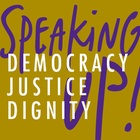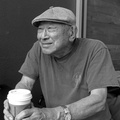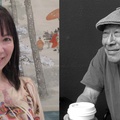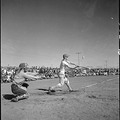Background
I will begin with a brief background of my life before camp as I feel it has some bearing on my reaction to the loyalty questionnaire or the so-called “Registration” order. My parents being aliens, foreigners, and outsiders, I remember that our life was quite marginalized. For example, my father’s store at the far end of town was always referred to as the “Jap store” by the people in town. Growing up, I constantly heard my father use the term “haiseki kurau”—become a victim of discrimination.
At school, we were not exactly segregated but as I’ve learned lately we were “tracked.” There were two classes in our grade: one for the offspring of prominent white families in town—ranch owners, merchants, town officials, fruit house managers, etc. There were a few JAs too. (I don’t know how they got in. Token minorities?) The other class that I was in consisted of kids of Japanese, Chinese, Spanish, Portuguese, and poor or working-class white families. This was the makeup of our class from the fifth on through the eighth grade, and because every year we had the same teacher, we said, “Mrs. Land got promoted too.”
One of the requirements to graduate from grammar school was to pass a written test on the U.S. Constitution. I guess we all passed; I don’t know anyone who failed. I got a score of 99 but one student, a Nikkei girl, had a perfect paper. The point here is that, from age 13, I was familiar with the Constitution, especially the first ten amendments, the Bill of Rights.
1942
Now we fast forward a few years to 1942. I was working on a fruit ranch that our family was share-cropping. I was two years out of high school and waiting for my brother, who was a senior, to graduate so I could go on to college. I had done my senior year at a high school in Los Angeles from which I was graduated and where I had made a few white friends who had made me feel equal, that I was an American just as they were. I was idealistic and ambitious, eagerly looking forward to my future.
When we were ordered to move out, my father was confined in a TB Sanatorium so my mother and I settled our affairs, packed, and managed to transport ourselves in our ranch pickup to the departure point.
At the Camp
We first went to a temporary camp, then were transferred to Tule Lake concentration camp.
Felt Liberated
Despite the privation of camp, I felt liberated. It was a chance to meet new people from different areas and backgrounds; there were meetings and classes to attend—a lot of intellectual stimulation that I had been missing. But most of all I had a chance to meet people with a common interest in writing and in theater and I became active in both the writing club and in the little theater. In fact, I was having a ball, with a chance to act in plays before an audience.
Loyalty Review Program
Then in February 1943 we were ordered to answer a series of questions including Questions 27 and 28, the loyalty questions. My first reaction was outrage. How dare they question my loyalty as an American. I was not going to comply with the order. I was not going to register. I was already angry at the injustice of incarceration when I was made guilty only because of my face, without due process and without trial. I understood “without trial” but I always wondered what “due process” meant. Well, when I read the recent book A Principled Stand: The Story of Hirabayashi v. United States by James and Lane Hirabayashi, I found the following quotation of Daniel Webster’s definition of due process of law: “a law which hears before it condemns, proceeds upon inquiry, and renders judgment only after trial.” This made it abundantly clear that the government had side-stepped due process in betraying us.
There was much confusion in the camp over the registration order—whether to comply with the order, whether to answer yes or no to the crucial questions. I attended a few emotionally-charged meetings that were not helpful at all. Everyone was angry, there was a lot of shouting, sometimes against each other.
Since my father was not with us (he was outside in a TB sanatorium) we had several well-meaning friends who came to advise us. One who was a close family friend—his family was in Japan so he was pro-Japan—was an influence, especially on my mother whose main concern was to keep the family together.
Another man, the father of my classmate in high school with whom I had competed, came over one day and told me “You, like my son, have a very promising future. I hate to see you jeopardize that future. Think carefully before you make your decision.” When the other friend, the pro-Japan one heard this, he confronted the man, told him he was meddling, that it was no business of his and rudely shut the door on him. I felt terrible about this. Though we did not agree politically, I knew that he had meant well, that he was only concerned about my welfare.
In the final analysis, the decision was my own and I went with my gut feeling. There were two persons outside of camp who influenced my decision. What they did seems trivial and unimportant, yet it made a difference. One was the wife of the ranch owner where we had share-cropped. Mother took a class in doll-making at Tule Lake and when she finished making a doll from yarn, she sent it as a gift to the woman who sent back a rather nasty letter implying that we in camp had nothing better to do than to make yarn dolls while they were struggling with the war efforts and living with rationing and shortages. That was her acknowledgment of the gift.
The other person was someone I thought was my favorite teacher in high school. When we first went to the temporary camp, I decided to form a theater group and I wrote to this teacher for advice and assistance. I had taken a course in public speaking from her and I had been her star student and she had been very encouraging. I was hopeful that she would remember me and respond to my letter but I never heard from her. Then I happened to see in our hometown newspaper that this teacher was the leader of a group agitating to keep the “Japs” from returning. Not only had we been betrayed by our government but also by people we trusted and respected, people we thought were friends.
What made the decision difficult was the warning by the War Relocation Authority (WRA) that the refusal to register was a violation of the Espionage Act and we would face 20 years in prison, a $10,000 fine, or both. Despite these dire threats I defied the order and refused to register. Then 35 years later, I learned the real truth of the registration when I read that the War Department had determined early on that the registration and the answering of the loyalty questionnaire by draft-age Nisei were not compulsory, that the threats of severe penalties had been a mistake and unwarranted. But the WRA, in order to save face, never revealed these facts to us, never, leaving us to think that we had done something wrong.
The immediate consequence of our action was that we were categorized as “disloyal Americans” and held at Tule Lake Segregation Center, a maximum-security prison, and were the last to be released. But the more lasting and hurtful consequence was the contempt, disdain, and ostracism that we faced in our own community, which forced us to be silent about our Tule Lake experience through the years, even to our own family members.
Recently, when I was serving on a panel I was given the question how I felt about the JACL apologizing to us for their actions during World War II—for disowning us, for scapegoating us as trouble makers and disloyal Americans, for encouraging the government to segregate us. My answer was that I felt indifferent about it. In fact, I don’t give a shit about it.
Do I have any regrets? No, I have no regrets. I followed my conscience and did it in protest. The price was steep but I have no regrets. I am annoyed, however, that I gave in to the government’s ploy to find us to be disloyal in order to justify their violation of our civil rights.
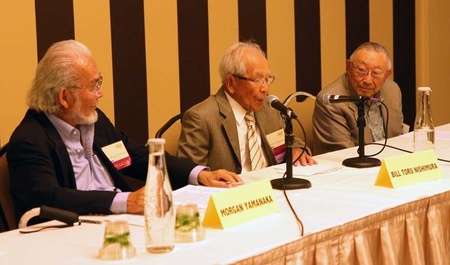
Session "The Tule Lake Segregation Center: Its History and Significance" on July 6, 2013. (Hiroshi Kashiwagi on the right) (Photo by Richard Murakami)
*Hiroshi Kashiwagi was a panelist on “The Tule Lake Segregation Center: Its History and Significance” session at JANM’s National Conference, Speaking Up! Democracy, Justice, Dignity in Seattle, Washington.
© 2013 Hiroshi Kashiwagi



